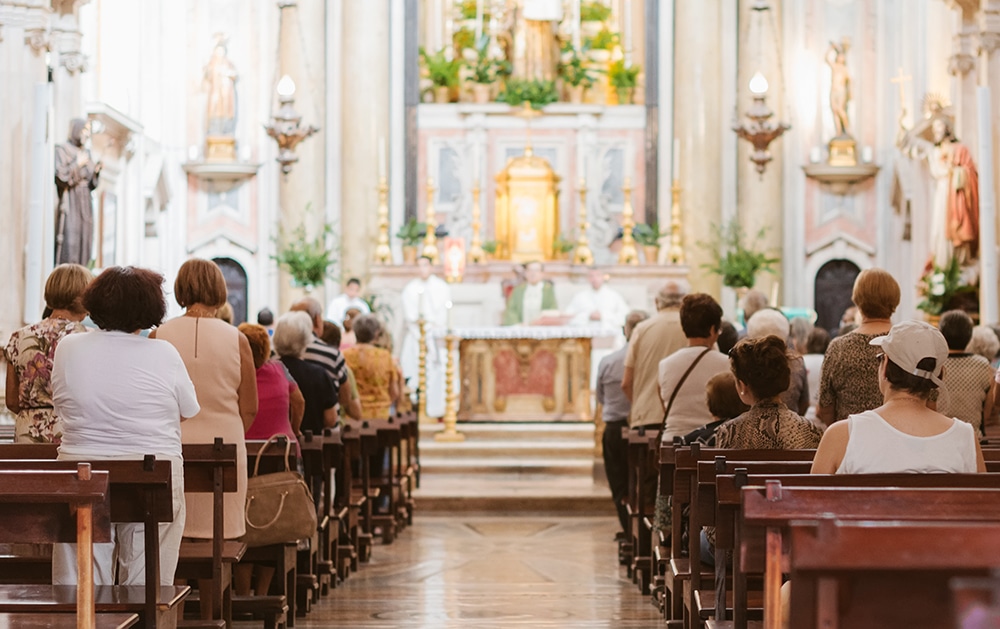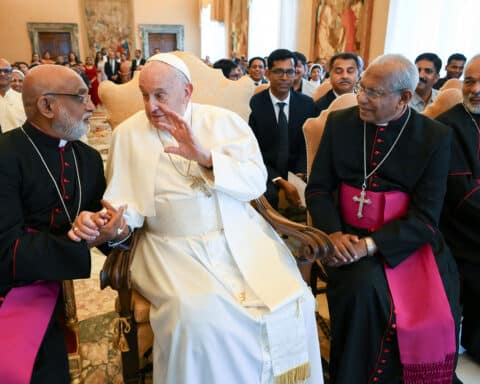One word runs through nearly every proper prayer in the Mass throughout the Easter season: mystery (or mysteries). It’s a word that we know from everyday life, but because it’s so familiar, we’re likely to misunderstand what it means in the context of the liturgy, if the word even registers at all when we hear it.
In a modern world still largely shaped by Enlightenment conceptions of reason, we associate the word mystery with Encyclopedia Brown, Nancy Drew and the Hardy Boys, or perhaps with Hercule Poirot and the various British and Canadian detectives who used to be the mainstays of PBS but now populate the video streaming services Acorn and BritBox. In the stories told in their books and shows, a mystery is a problem for which the detective seeks a solution. It’s a “whodunnit,” and the revelation of “who” in the climactic scene usually includes an explanation of why he or she committed the heinous crime that our intrepid hero was tasked with investigating.
Each mystery is a self-contained story, wrapped up in the course of the book or episode, never to be thought of again as our hero and we move on to the next puzzle to be solved.
Whether we consciously recognize it or not, this is the context that we have in mind when, at the beginning of every Mass, the priest says to us, “Brothers and sisters, let us call to mind our sins, and so prepare ourselves to celebrate the sacred mysteries.” And yet, right there, in those words at the beginning of the penitential rite of Mass, we can see — if we stop to think about it — that the mysteries we’re about to enter into are something different from the mysteries that Columbo and Jessica Fletcher solved for our amusement back when TV was still delivered over the air.
Miss Marple and Matlock and even Perry Mason never stopped for a moment of recollection before they set out to determine who the murderer was or why the accused should be set free. So why does calling to mind our sins prepare us to celebrate “the sacred mysteries”?
The answer lies in the reality that, at the very heart of the mysteries of the Mass, our sins take center stage. We come to Mass to worship God, but we also come to take part, again and again, in the mystery of our redemption. The mystery here is not a puzzle to be solved through rigorous investigation and intellectual brute force, but a reality to be entered into, the saving act that reconciles us to God and not only opens the gates of heaven to the faithful but allows us to begin to live the life of the saints in this world here below.
The “sacred mysteries” are, at heart, the singular mystery of our salvation, the Paschal mystery in which, as one of the prefaces to the Eucharistic Prayer for the Easter season tells us, Christ becomes the priest, the lamb and the altar — the one who sacrifices, the spotless victim who is sacrificed and the place in which the sacrifice occurs. Christ offers himself on Calvary for those sins that we call to mind at the beginning of Mass — sins committed 2,000 years after his death upon the cross, but sins that are present there at that moment of selfless sacrifice, just as he, and that moment, are present here at every Mass we celebrate two millennia later.
When we come to Mass, we place ourselves at the foot of the cross — there and then in Jerusalem, which is also here and now in our church. Our participation in Christ’s sacrifice begins by acknowledging that we have sinned and are in need of redemption. It ends in our reception of his body and blood, the true Bread from heaven offered up for our salvation, our food for the journey from death into life. Like the disciples with whom he walked on the road to Emmaus, we know him in the breaking of the bread, and receiving it worthily, we find ourselves born into a new life, into his life, as members of his body.
We will never fully understand, this side of heaven, just how Christ redeems us in this Paschal mystery. But unlike our favorite fictional detectives, we don’t need to wrap up each mystery in a nice little bow so that we can move on to the next. There is only one mystery in which we must take part, again and again, returning each time to the foot of his cross, acknowledging our sins and uniting ourselves to him in his death, so that we may rise every day with him to new life.





